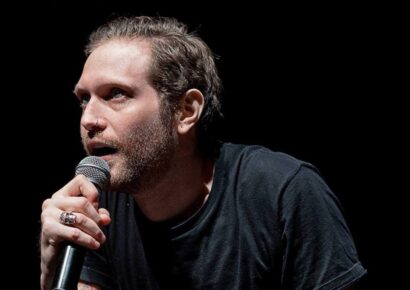Utterings of "out damn spot" or "tomorrow and tomorrow and tomorrow" have echoed across stages for centuries – but do you still remember which character uttered them?
Shakespeare’s ode to power, Macbeth, and the madness accompanying it, is a well-worn tale; one that most of us vaguely remember studying in high school, or perhaps from the hundreds of stage and screen iterations smattered across recent history.
Malthouse’s Macbeth (An Undoing), written by accomplished and thought-provoking UK playwright Zinnie Harris, is hoping you do – because otherwise you might find yourself a little lost when you wonder whether you missed the part in the original when Lady MacDuff was part of a plot twist (she wasn’t) or whether they said ‘fuck’ so many times in between the ‘thou art’s (they didn’t).
Explore Melbourne’s latest arts and stage news, features, festivals, interviews and reviews here.
So by way of warning you, a quick Wiki on the way to the theatre may be your friend – because Harris’ rendition is not only a mind fuck (there’s that word again), it’s also wrestling gender swapping, post-feminist theory, breaking the fourth wall, and a few cheeky additions into old William’s original text. And hey, if anyone is brave enough to do it, it’s Harris – who has been reworking classic plays from a feminist perspective for a while now.
Director Matthew Lutton takes the reins here, choosing his Lady Macbeth (Bojana Novakovic) and Macbeth (Johnny Carr) for their modern appeal – after all, this isn’t a traditional rendition of the bloody and murderous ode, a point further punctuated by Dann Barber’s incredible set design and layered costumery imbued with meaning.
The play opens with witchy narrator Carlin (Natasha Herbert) telling us this isn’t your usual Macbeth – although she does promise blood and gore, and lots of it. And as she steps onto the fascinating set – a rotating stage that is changed and adapted so deftly, you’ll have yourself wondering if they have the whole castle backstage – you can’t help but consider one of the original opening lines of the play. Fair is foul, and foul is fair – and nothing in this adaption is going to be as it seems.
Though Harris imbues her vision with a light touch through the first half, including a few plot adaptions and winks to the audience, it’s in the second half that her modern reflection on Macbeth inserts itself more aggressively. Macbeth’s increasing torment is palpable, while Lady Macbeth tries to keep the fledgling monarchy together – but it’s a momentum she can’t halt.
As Lady Macbeth falls apart, so does her costume – breaking character to demand better treatment from her stage assistants. It’s a dual girl boss nod and commentary on the history of women’s hysteria that attempts to recast Lady Macbeth as the only ‘sane’ person trying to keep the prophecy from running afoul – but, like Harris’ modern injections into the script, it’s hard for these moments of unexpected contemporaneity not to take away from the gravitas of the source text.
In the background, MacDuff (played by the stoic and occasionally scene-stealing David Woods) rallies troops against the Macbeths, and Banquo (the charismatic Rashidi Edward) haunts the castle – and all the while, the increasing horror of Lady Macbeth’s ambition unfolds, as she attempts to alter the path of the story that has run its course for 400 years. But the weight of history appears too much for Harris’ Lady Macbeth, and in her final dying moments the agency of her death is ripped from the pages of history – an odd choice for a seemingly feminist rendition.
Lutton’s Malthouse delivery of Macbeth (an undoing) is as visually stunning as it is thought-provoking and genre-breaking. And while it brazenly attempts to rewrite Shakespearean cannon with a self-aware nod to contemporary stagecraft and modern feminist movements, its reliance on the audience’s intimate knowledge of the original may be its hill to climb – but that doesn’t make it any less fascinating.

